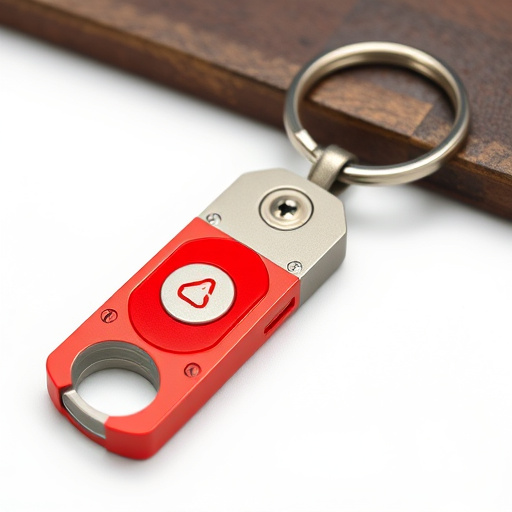The legality of metal keychain defense tools in the US varies greatly by state, with regulations influenced by federal and local laws. Some states permit open carry, while others restrict them to concealed carry with permits. These tools are considered legal forms of personal protection under "lawful self-defense" but users must understand local rules regarding size, shape, and force types. Non-lethal options like pepper spray keychains or stun guns are recommended for compliance and safety. Always consult state-specific guidelines before carrying metal keychain defense tools to avoid legal issues.
“Uncovering the legalities behind metal keychain defense tools is essential for responsible citizens seeking personal protection. With an increasing trend in self-defense weapon options, understanding state-specific regulations is crucial. This article navigates the defensive keychain legal carry guidelines across various states, offering insights into their regulatory frameworks. From identifying permitted carrying options to exploring state-specific usage rules, we guide you through essential considerations for legally and safely employing metal keychain defense tools.”
- Understanding the Legal Landscape: Keychain Defense Tools and Their Regulatory Framework
- Which States Allow Metal Keychain Self-Defense Weapons?
- State-Specific Guidelines: Permitted Carrying and Usage
- Essential Considerations for Legal Carry and Safety When Using a Metal Keychain Defense Tool
Understanding the Legal Landscape: Keychain Defense Tools and Their Regulatory Framework
In the United States, the legal framework surrounding metal keychain defense tools is a complex web of state and federal regulations. It’s crucial to understand that while these tools are marketed as personal defense devices, their legality varies significantly across states. Some states explicitly allow the open carry of such tools, while others restrict them to concealed carry with appropriate permits. Additionally, there are often specific guidelines regarding the size, shape, and functionality of these devices, ensuring they don’t cross into the realm of weapons.
The classification of metal keychain defense tools as legal self-defense instruments is subject to interpretation. Regulators consider factors such as their potential for causing harm, the circumstances under which they’re carried, and whether they can be readily accessed for use. Given their compact size and ease of carry, these tools must adhere strictly to local laws to avoid legal repercussions. Always consult your state’s specific guidelines before considering a metal keychain defense tool as a personal safety measure.
Which States Allow Metal Keychain Self-Defense Weapons?
In the United States, the legality of metal keychain defense tools varies significantly from state to state. While some states explicitly permit the carrying of self-defense weapons in certain forms, others have stricter regulations or ban them entirely. Metal keychains designed for self-defense are typically considered as a form of personal protection and fall under the category of “lawful self-defense” in many jurisdictions.
Several states allow the legal carry of metal keychain defense tools under specific conditions. For instance, Texas permits the carrying of certain types of self-defense weapons, including keychains, without a permit. Similarly, Florida and Arizona also have laws that protect the right to carry self-defense tools, including metal keychains, for personal protection. However, it’s crucial to understand the local regulations and any restrictions on size, shape, or the type of force the device can deploy to ensure compliance with state laws. Always consult legal experts or relevant authorities for the most accurate and up-to-date information regarding the legal status of metal keychain defense tools in your specific state.
State-Specific Guidelines: Permitted Carrying and Usage
In the United States, the legal carry guidelines for defensive keychain tools vary significantly from state to state. Understanding these regulations is crucial before considering the possession and use of metal keychain defense tools. Some states explicitly allow the carrying of personal protection devices (PPD), including certain types of keychains designed for self-defense, while others have stricter restrictions. For instance, California has stringent laws regarding the carry of any weapon, including self-defense tools, while Texas offers more liberal provisions, allowing individuals to carry protective devices without a permit in most public places.
When navigating state-specific guidelines, it’s essential to focus on metal keychain defense tools that fall under legal definitions of non-lethal or less-lethal force options. These typically include devices designed for personal safety, such as pepper spray keychains or stun guns, which are permitted in many states under specific conditions. Always check local laws and regulations to ensure compliance and avoid any legal repercussions.
Essential Considerations for Legal Carry and Safety When Using a Metal Keychain Defense Tool
When it comes to metal keychain defense tools, understanding legal carry guidelines is paramount for your safety and well-being. Before equipping yourself with such a device, it’s crucial to familiarize yourself with state laws regarding hidden weapons. Each state has its own set of rules, so checking local legislation is essential. Legal carry permits vary widely, so ensure you have the appropriate permission to wield a metal keychain defense tool publicly.
Safety should always be your top priority when considering metal keychain defense tools. These devices are designed for personal protection, but their use comes with responsibilities. Proper training and practice are necessary to master the tool’s effectiveness while minimizing the risk of injury or accidental deployment. Regularly review safety protocols, keep your device in a secure case when not in use, and ensure those around you understand its purpose to avoid panic or misunderstandings.
Understanding the legal framework surrounding metal keychain defense tools is paramount for those looking to arm themselves for self-defense. Each state has its own set of guidelines, but by adhering to these regulations and prioritizing safety, individuals can ensure they are acting within the law while protecting themselves. When carrying any self-defense weapon, knowledge of local laws and responsible use are essential to maintain personal safety and community peace.
